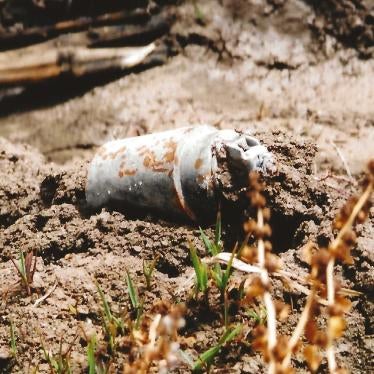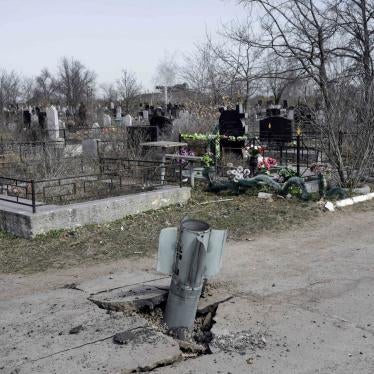Thank you for the floor Mr. President.
In the mid-1990s, CCW States Parties negotiated new protocols on blinding lasers and landmines at the same time. From 2000 to 2003 they in essence simultaneously carried out negotiations on explosive remnants of war and antivehicle mines. It is time for States Parties to again engage in two-track negotiations, on lethal autonomous weapons systems and on incendiary weapons.
Looking first at lethal autonomous weapons systems – Human Rights Watch is one of the founders of and is now the global coordinator of the Campaign to Stop Killer Robots. The Campaign calls for a preemptive ban on fully autonomous weapon systems, those that would be able to select targets and fire on them without meaningful human control. We believe that a ban is required because of the multitude of moral, ethical, legal, technical, proliferation, and other concerns raised by the weapons. A ban is the only viable solution. Some today have pointed toward a “best practices” approach, but the best practice is no acquisition and no use.
There should be a sense of urgency in moving forward on this issue, as technology races forward. Many of you may have seen the long, front page story in the New York Times yesterday highlighting the US’s Long Range Anti Ship Missile, the UK’s Brimstone missile, and swarm weapons more generally as examples of how far and how fast the technology is moving.
As the technology barrels ahead, CCW delegates are debating whether to discuss the issue for four or for five days next year, and whether to have documentation. It is difficult to make the case that eight or nine days of informal talks over a two year period constitutes serious consideration of the matter.
Members of the Campaign to Stop Killer Robots literally cheered last November when CCW States Parties agreed to the initial mandate to work on lethal autonomous weapon systems. We hailed the May 2014 Meeting of Experts as a great success. And we are pleased that it appears another mandate will be agreed to this week for work next year. We very much appreciate that so many nations today have stressed the importance of this issue and the need to address it.
But the mandate before you now is a big disappointment. Delegates should not be debating four vs. five days of work, but rather two weeks vs. three weeks. Documentation should be a given if states are serious about a sustained process, with a concrete outcome, rather than just a couple talk shops on the issue.
The mandate shows no real forward movement, no deepening of the work. There is a striking disconnect between states repeatedly saying how complicated this issue is, and how many questions remain unanswered, but then not dedicating adequate time to address them.
Our hope is that the week of talks in 2015 will set the stage for much more extensive and intensive formal discussions in 2016. We hope the 2015 talks will further solidify the emerging consensus that there should always to meaningful human control over targeting and kill decisions. States Parties should be planning for three to four weeks of work in 2016, in the lead-up to the Review Conference, where a negotiating mandate should be agreed. Throughout the entire history of the CCW, the only time progress has been made on an issue has been when States Parties devoted at least three to four weeks in a year to it.
Outside the CCW, it will still be useful to address lethal autonomous weapons in the Human Rights Council, as the potential development of these weapons systems is relevant to domestic law enforcement and human rights law, as well as situations of armed conflict and the applicability of international humanitarian law.
And it is essential that states move forward with the development of national policies on lethal autonomous weapons. The lack of national policies is a sharp brake on international progress on this issue.
Turning to incendiary weapons -- It is increasing clear that the time has come to strengthen Protocol III on incendiary weapons. The use of incendiary weapons this year in Syria and Ukraine drives home the need to do so now. We were pleased to hear so many states express concern today about incendiary weapons.
At a side event yesterday, Human Rights Watch provided extensive documentation of the recent use of incendiary weapons in Syria and Ukraine, and the devastating consequences. The global outcry against use of incendiary weapons, including white phosphorus, is growing ever stronger, and CCW States Parties should build on this momentum.
We urge you to respond to the cries of the victims of these cruel weapons by turning Protocol III into a meaningful and effective prohibition, rather than one riddled with loopholes and inconsistencies.
We hope many more States Parties will express their concern about and condemn ongoing use of incendiary weapons, and will support, at a minimum, focused and formal discussions on incendiary weapons, leading to the re-opening of Protocol III for amendment.
We hope that the final report from this meeting will place incendiary weapons squarely on the agenda for further CCW work.
Thank you.







